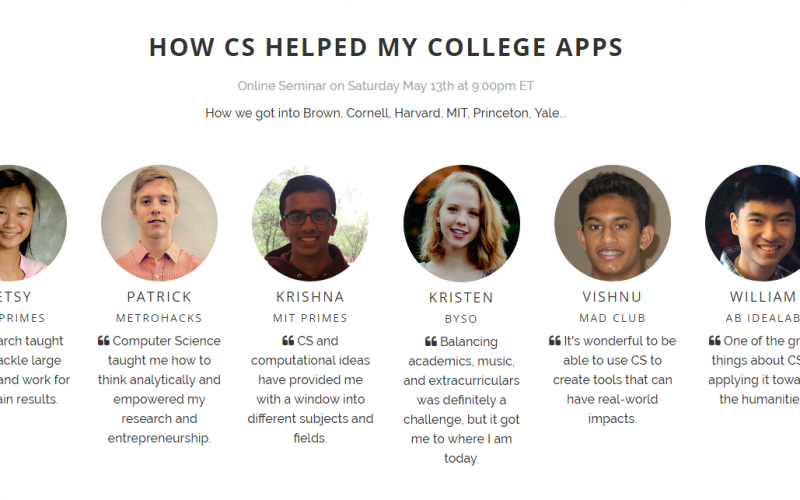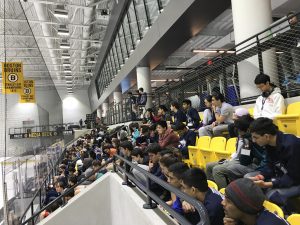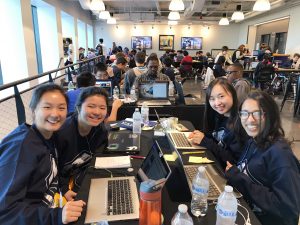Leadership Research Competitions Motivation / How do I get my child interested in CS?
[ps2id id=’leadership’ target=”/]Leadership
All six panelists had held leadership positions enabled by their CS backgrounds. One student was the captain of his high school’s CS club; another attended a high school without a CS club and founded his own. A different panelist joined a RC car racing team, where her coding ability allowed her to quickly rise to a captainship.“Because I knew how to code and a lot of my teammates didn’t know how to code, I actually got put in charge of the project team. Now I’m captain of the racing team… CS really put me into a position where I had a leadership place on a team.” —KHThey had capitalized on the practical nature of coding, and formed a mobile app development club and a team that builds websites for non-profit organizations. Several panelists organized “hackathons”— large events where students gathered to learn coding, build projects, and compete for prizes. Among these was MetroHacks, which hosted 250+ high school students for 24 hours of workshops and code, making it the largest hackathon for high school students in New England.
“My best opportunity to develop soft skills and organizational skills was made possible by knowing CS. As a MetroHacks organizer, I learned about budgeting, fundraising, and event logistics, but also teamwork and the courage to speak in front of hundreds of people.” — BP[ps2id id=’research’ target=”/]
Research
It’s common knowledge that doing research during high school can greatly help a student’s college application stand out. The panelists conducted research in a variety of fields. One studied neuroscience with a Harvard Medical lab. Others worked on projects in education, cryptography, networks, and epigenomics at MIT.The shared characteristic of these research experiences? They were all made possible by knowing CS.
“If you’re looking for research positions, many people will take a computational analyst as opposed to a research lab intern because they don’t actually have to train you in [wet lab techniques]” — PH (computational neuroscience)
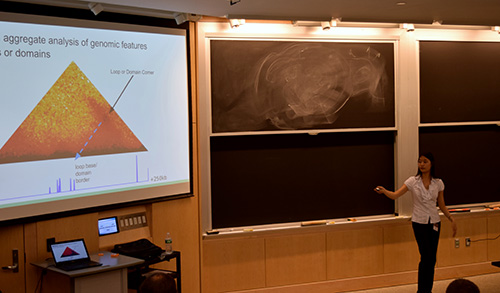
“If you’ve done something like KTBYTE classes up to a certain level, you don’t have to be a grad student to do that kind of research.” — KS (cryptography, computational epigenomics)Another student had independently sought out his research position, but still cited his CS background as crucial to attaining the position.
“My classes at KTBYTE were probably one of the main reasons why I was offered positions in many computational labs.” — PHBeyond their contribution to the students’ college admissions, they considered the process of doing research a transformative experience with long-lasting impact on their lives.
“Rather than reading knowledge out of a textbook, you’re creating new knowledge. You’re using knowledge you learned in computer science classes applying it to real-world problems, and working alongside real researchers and professors and grad students… It actually teaches a completely new way of thinking, because the questions you try to answer don’t have an answer you can just look up.” — KSStudents describe doing research in MIT-PRIMES: KTBYTE-PRIMES Panel The panelists also shared their advice on applying to PRIMES! Read it here. [ps2id id=’competitions’ target=”/]
Competitions
“The USACO was one of my few national awards, so that’s probably quite important [to my college apps].” — PHAll of the panelists had participated in computer science competitions, which were a great way for them to demonstrate their skills to colleges. Like other major STEM subjects, placing well in the national-level competition, the USA Computing Olympiad (USACO), is considered a huge accomplishment. What the students emphasized was also the unique accessibility of computer science competitions. While other subjects often have qualifying rounds at the school or regional levels, the USACO has no such limits to participation, and can be taken online from the comfort of one’s home. Students describe their USACO experiences here: KTBYTE-USACO Panel [ps2id id=’motivation’ target=”/]
Motivation
After hearing about all the different ways CS had benefited the panelists, many of the parents in the audience asked:How do I get my kid interested in learning computer science?
“It seemed like I’d always find time outside of classes and schoolwork to write code.” — WWFor some of the panelists, a love of coding came as naturally as breathing. However, for many of the others, their interest in CS was learned through a combination of immersion, parental encouragement, classes, and seeing the applications of CS when combined with their other interests.
“My school forced us to take CS in sixth grade, and honestly I hated it… but when I went to a KTBYTE summer [weeklong course], we were doing projects that really got me interested in the applications of coding. From that point on I actually liked CS.” — KHOther students stated that classes gave them an appreciation of the logical elegance of computer science. However, they stressed that it was still the things they could do with CS that really drove them to continue learning.
“I really fell in love with CS because it’s kind of abstract, kind of like math… but it takes that abstraction and it allows you to apply that to many practical applications.” — VM
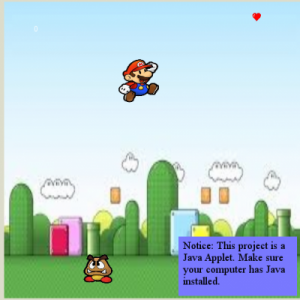 One panelist still plays the Mario-styled game she built years ago in the KTBYTE class where she first started enjoying computer science. Her advice for parents and students who hope to nurture a love of coding is:
One panelist still plays the Mario-styled game she built years ago in the KTBYTE class where she first started enjoying computer science. Her advice for parents and students who hope to nurture a love of coding is:
“Find some project you like, find a way to code that using CS, and eventually you will come to like programming in general.” — KHEven those who naturally gravitated towards CS as children found pleasure in combining it with arts and humanities to build games, online art portfolios, and animations.
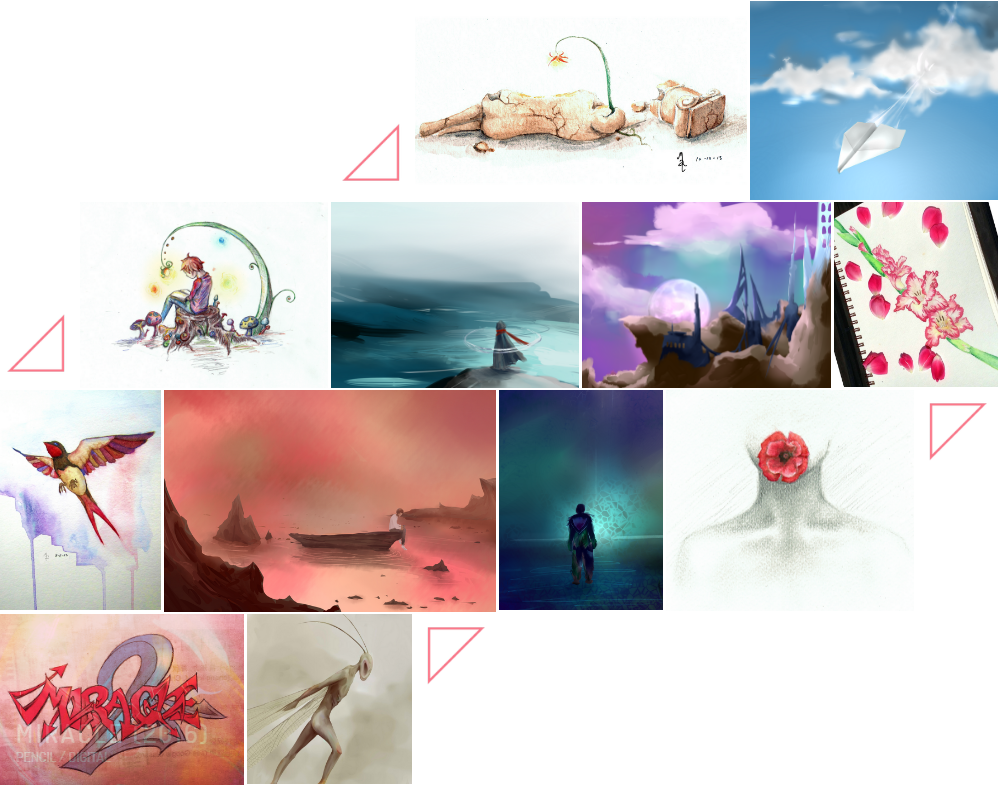
“If you find something that is your fire, adding computer science to the mix will only make the fire grow stronger.” — WW
[wpforms id=”2359″ description=”true”]
Related Posts

MIT PRIMES (Program for Research in Mathematics, Engineering and Science for High School Students) is an elite, year-long research program that gives talented students a head-start […] Read More
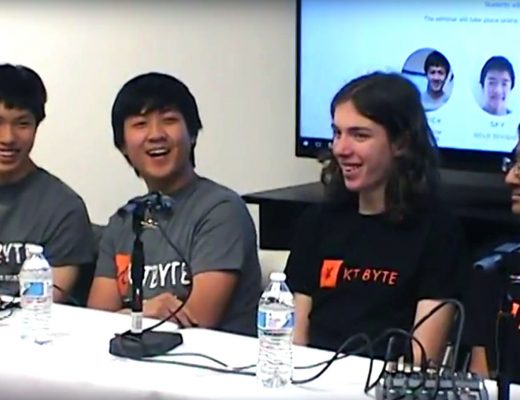
Listen to KTBYTE students discuss their USACO experiences: The USA Computing Olympiad, more commonly known as USACO, is a series of annual competitions aimed at […] Read More
